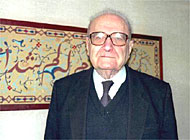Geneva gives anti-racism groups right to sue Holocaust deniers

Canton Geneva has opened the way for survivors of genocide and anti-racism associations to sue those who deny the Holocaust. The move closes an important anomaly in federal racial discrimination legislation.
In approving the amendment to the cantonal penal code on racial discrimination, Geneva’s parliament is the first in Switzerland to categorically state that anti-discrimination groups can bring a civil action against Holocaust deniers.
The move is seen as important because, with the number of Holocaust survivors dwindling, it’s up to anti-racism organisations to continue the fight.
“Without the associations, who will there be to combat Holocaust denial?” asked lawyer Philippe Grumbach, of the Swiss branch of the International League Against Racism and Anti-Semitism (LICRA).
Grumbach has been the driving force behind the change to the cantonal law. It was him who asked the canton to act after LICRA lost a case because of the loophole in the federal penal code.
Along with a survivor of Auschwitz and a man whose relatives had died in the Holocaust, LICRA had brought proceedings against a Geneva bookshop owner who stocked the controversial book “The Founding Myths of Israeli Politics” by the French philosopher, Roger Garaudy.
The bookshop owner was found guilty of racial discrimination, but acquitted on appeal. The Federal Court ruled that neither associations nor descendants of Holocaust survivors could be litigants in such a civil action.
“This was a clear injustice,” said Grumbach.
“It was also a paradox, because the Swiss penal code has an excellent text on Holocaust denial, but it’s impossible to apply it,” he told swissinfo.
The article on racism in the federal penal code is vague on the right of plaintiffs to take civil action in a case of racial discrimination. As a result, the cantons interpret it differently, though generally only those people directly wronged by a crime can bring a civil suit.
As such, those most affected by the Holocaust and those fighting for their rights are unable to take action against those who deny the genocide happened.
LICRA points out that Geneva’s modified law brings it more into line with legislation in France and Germany, where anti-racism associations like LICRA have played a key role in bringing cases against neo-Nazi groups.
“It’s just a first step. Switzerland is still a long way behind other countries. I hope other cantons follow Geneva’s example,” Grumbach said.
“I hope that this right will be granted to associations at a federal level, but that will be more difficult.”
Geneva’s cantonal parliament has made a habit of being a pioneer in Switzerland. As well as this latest amendment, the canton has recently become the first in Switzerland to offer statutory maternity benefit and to recognise the status of homosexual couples.
by Roy Probert

In compliance with the JTI standards
More: SWI swissinfo.ch certified by the Journalism Trust Initiative
You can find an overview of ongoing debates with our journalists here . Please join us!
If you want to start a conversation about a topic raised in this article or want to report factual errors, email us at english@swissinfo.ch.